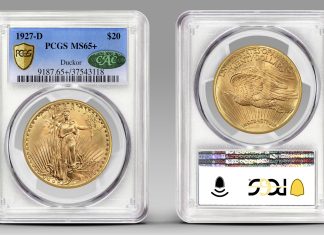
Gold prices on Wednesday fell sharply for a second day in a row and to a more than nine-month low.
Gold for June delivery ended down $22.40, or 1.4%, to $1,553.50 an ounce on the Comex in New York. The settlement price was the lowest since June 28.
"There is a lack of interest in gold right now and everybody seems to be sitting on the sidelines. Stocks are still looking more attractive for investors than gold and that’s where money continues to flow into," Reuters quoted Yuichi Ikemizu, branch manager for Standard Bank in Tokyo.
"The $1,550 level is the low for the current ranges and I doubt that prices will break below that level."
Gold traded as low as $1,549.70 and hit its top at $1,577.30. Prices fell $25.00 during the previous session.
Silver prices dropped for a six consecutive session. Silver for May delivery lost 45.1 cents, or 1.7%, to $26.797 an ounce, ranging from $26.670 to $27.315.
PGMs continued lower Wednesday:
-
July platinum tumbled $32.30, or 2.1%, to $1,541.90 an ounce, trading between $1,534.00 and $1,578.00.
- Palladium for June delivery fell $13.95, or 1.8%, to $755.45 an ounce, moving between $751.75 and $773.95.
London Bullion Prices
Precious metals in London declined also, across the board. With the exception of silver, losses were slighter than bullion futures in New York. When comparing the Tuesday PM to Wednesday PM London fixings:
- Gold shed $8.75, or 0.6%, to $1,574.75 an ounce,
- Silver plunged 77.0 cents, or 2.8%, to $27.19 an ounce,
- Platinum dipped $10.00, or 0.6%, to $1,569.00 an ounce, and
- Palladium declined $8.00, or 1.0%, to $765.00 an ounce
US Bullion Coin Sales in April
For a third straight day, sales of United States Mint gold bullion coins advanced. U.S. Mint authorized purchasers scooped up 10,000 ounces of gold coins. Splits were 8,500 ounces in Gold Eagles and 1,500 ounces of Gold Buffalos.
Sales of the bureau’s American Silver Eagles remained muted after surging 814,000 on Monday to hit a year-to-date milestone of more than 15 million. The amount had never been reached by April 1.
The following are April and year-to-date bullion coin totals as reported by the U.S. Mint.
| American Eagle and Buffalo Bullion Coin Sales | ||||
|---|---|---|---|---|
| Wednesday Sales | Last Week | Week-To-Date / April Sales | YTD Sales | |
| $50 American Eagle Gold Coins | 7,000 | 13,500 | 13,500 | 260,000 |
| $25 American Eagle Gold Coins | 0 | 1,000 | 1,000 | 27,000 |
| $10 American Eagle Gold Coins | 2,000 | 4,000 | 2,000 | 48,000 |
| $5 American Eagle Gold Coins | 10,000 | 15,000 | 20,000 | 235,000 |
| $50 American Buffalo Gold Coins | 1,500 | 1,000 | 2,000 | 97,000 |
| American Silver Eagle Bullion Coins | 0 | 918,500 | 812,000 | 15,035,000 |
All bullion figures above are in the number of coins sold. Calculate total ounces by using the bullion coin’s weight.
U.S. Mint authorized purchasers have claimed all the available America the Beautiful Five Ounce Silver Bullion Coins. The U.S. Mint has not yet released any of the 2013-dated versions.











This nosedive in prices has nothing to do with physical demand and everything to do with paper contracts and their manipulation. Remember it is taking Germany seven years to get a fraction of its gold back. Why? Because it isn’t there where it is supposed to be. It has been sold and resold into the market in a leasing game gone bad. China and Russia are accumulating gold like there is no tomorrow. Sooner or later when someone takes physical delivery of their paper gold contract…. They will be told, “Sorry. We don’t have it. But here’s a check for… Read more »
Former treasury official Paul Craig Roberts just said: “I think the last couple of days there has been an amazing amount of selling on the part of the Fed. It’s paper shorts, not actual people selling bullion. But they are trying to bust up the momentum in gold so they can hold on to their low interest rates, high bond prices, and continue printing money. You see if the Fed can’t print money they can’t finance the federal budget deficit. Printing money is also how the Fed buys the bonds to drive up the derivative debt-related instruments on the banks’… Read more »